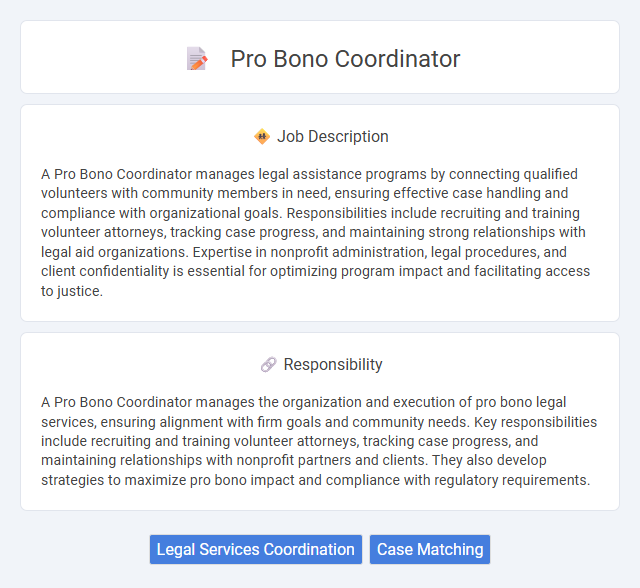
A Pro Bono Coordinator manages legal assistance programs by connecting qualified volunteers with community members in need, ensuring effective case handling and compliance with organizational goals. Responsibilities include recruiting and training volunteer attorneys, tracking case progress, and maintaining strong relationships with legal aid organizations. Expertise in nonprofit administration, legal procedures, and client confidentiality is essential for optimizing program impact and facilitating access to justice.
Individuals who possess strong organizational skills and a passion for social justice may be well-suited for a pro bono coordinator role. Those comfortable managing multiple tasks and coordinating volunteer activities under time constraints are likely to thrive in this position. People who prefer structured, administrative responsibilities rather than direct client interaction might find this role particularly compatible with their strengths.
Qualification
Pro bono coordinators require strong organizational and communication skills, along with a deep understanding of legal procedures and ethical standards. A bachelor's degree in law, social sciences, or related fields combined with experience in volunteer management or legal services significantly enhances job performance. Familiarity with case management software and the ability to liaise between attorneys and clients are essential qualifications for effectively managing pro bono programs.
Responsibility
A Pro Bono Coordinator manages the organization and execution of pro bono legal services, ensuring alignment with firm goals and community needs. Key responsibilities include recruiting and training volunteer attorneys, tracking case progress, and maintaining relationships with nonprofit partners and clients. They also develop strategies to maximize pro bono impact and compliance with regulatory requirements.
Benefit
Pro bono coordinators likely enhance organizational reputation by facilitating valuable legal services to underserved communities. They probably improve lawyer engagement and professional development through meaningful volunteer opportunities. The role may also increase access to justice, benefiting both clients and the broader community.
Challenge
The role of a Pro Bono Coordinator likely involves managing complex case assignments and balancing the needs of multiple stakeholders, which can present significant logistical and communication challenges. Coordinators probably face pressure to maximize volunteer lawyer engagement while ensuring compliance with legal and ethical standards. Navigating these demands requires strong organizational skills and the ability to troubleshoot unexpected issues efficiently.
Career Advancement
Pro bono coordinator roles provide valuable experience in legal project management and client relations, essential for career advancement within law firms or nonprofit organizations. Mastery of coordinating volunteer legal services and managing community partnerships enhances leadership skills, opening pathways to senior positions such as pro bono program director or legal services manager. Developing expertise in tracking case outcomes and reporting impact metrics also strengthens qualifications for strategic roles focused on access to justice initiatives.
Key Terms
Legal Services Coordination
A Pro bono coordinator manages the allocation and oversight of legal services offered without charge, ensuring efficient matching of volunteer attorneys with clients in need. This role involves tracking case progress, facilitating communication between law firms and nonprofit organizations, and maintaining compliance with legal and ethical standards. Pro bono coordinators play a critical role in expanding access to justice by optimizing resources and supporting underserved communities through effective legal services coordination.
Case Matching
A Pro Bono Coordinator specializing in Case Matching efficiently connects eligible clients with volunteer attorneys based on legal needs and attorney expertise, ensuring maximum impact and resource utilization. Utilizing advanced database systems, the coordinator tracks case progress, attorney availability, and client demographics to optimize the matching process. This role improves access to justice by streamlining communication between legal professionals and underserved populations.
 kuljobs.com
kuljobs.com